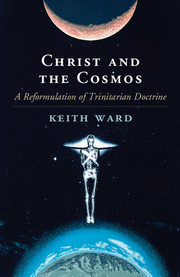Book contents
- Frontmatter
- Contents
- Preface
- Acknowledgements
- PART I THE THREEFOLD NATURE OF THE DIVINE BEING
- PART II THE BIBLICAL SOURCES OF TRINITARIAN THOUGHT
- PART III THE TRINITY, IMMANENT AND ECONOMIC
- 11 Why Three?
- 12 The Trinity and Revelation
- 13 Hegel and Modern Theology
- 14 The Immanent Trinity
- 15 The Identity of the Immanent and the Economic Trinity
- 16 Hegel Again
- 17 What Creation Adds to the Trinity
- 18 The Epistemic Priority of the Economic Trinity
- 19 The Trinity and Naive Realism
- 20 The Trinity and the Cosmos
- 21 Revelation and the Immanent Trinity
- PART IV THE SOCIAL TRINITY
- PART V THE COSMIC TRINITY
- Bibliography
- Subject Index
- Name Index
11 - Why Three?
from PART III - THE TRINITY, IMMANENT AND ECONOMIC
Published online by Cambridge University Press: 05 September 2015
- Frontmatter
- Contents
- Preface
- Acknowledgements
- PART I THE THREEFOLD NATURE OF THE DIVINE BEING
- PART II THE BIBLICAL SOURCES OF TRINITARIAN THOUGHT
- PART III THE TRINITY, IMMANENT AND ECONOMIC
- 11 Why Three?
- 12 The Trinity and Revelation
- 13 Hegel and Modern Theology
- 14 The Immanent Trinity
- 15 The Identity of the Immanent and the Economic Trinity
- 16 Hegel Again
- 17 What Creation Adds to the Trinity
- 18 The Epistemic Priority of the Economic Trinity
- 19 The Trinity and Naive Realism
- 20 The Trinity and the Cosmos
- 21 Revelation and the Immanent Trinity
- PART IV THE SOCIAL TRINITY
- PART V THE COSMIC TRINITY
- Bibliography
- Subject Index
- Name Index
Summary
Christianity is founded on belief in the divinity of Jesus, and also on belief in the transcendence over all finite things of the creator God. Difficult though it was in the context of Jewish monotheism to think of God as having two distinct forms of divinity in this way, it seems an inevitable consequence of Christian belief. But Christians believe in a threefold God, and it has not always seemed clear, even to Christian theologians, that this was an obvious implication of Christian faith. At least one major Christian theologian of recent times has questioned whether belief in a threefold God is strictly necessary for Christians.
In an important paper, ‘Why Three?’ (Wiles, 1967), the theologian and Patristics scholar Maurice Wiles shows that Christian writers in the first few Christian centuries were quite unclear and diverse in their allocation of roles to the three persons of the Trinity – although he admits that the Trinitarian formula as used in liturgy was present from the earliest times. Among the things that were unclear were these: whether the Spirit was a different person from the Son, whether Son or Spirit could more properly be termed the ‘Wisdom’ and the ‘Love’ of God, and whether the activities of the persons in relation to created reality were indivisible or indistinguishable.
After recounting some main differences of view between major writers of those early years, he proposes that the idea of divine threefoldness is ‘an arbitrary analysis of the activity of God, which though of value in Christian thought and devotion is not of essential significance’ (Wiles, 1957, p. 15). I think the word ‘arbitrary’ is too strong, although it is true that the activities of God could easily be described in different ways.
For example, if you think of what might be said to make the idea of a mind-like, purposive, and supremely valuable creator of the cosmos intelligible, you could say that such a creator would have to know all possible states it could create, evaluate them and perhaps actualise some of them in the divine being itself, appreciate them when actualised, and maybe create new sorts of possible states which might arise from what had already been created.
- Type
- Chapter
- Information
- Christ and the CosmosA Reformulation of Trinitarian Doctrine, pp. 85 - 91Publisher: Cambridge University PressPrint publication year: 2015



